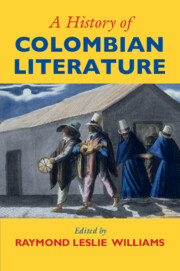Book contents
- Frontmatter
- Contents
- Notes on contributors
- Preface
- Introduction
- PART I LITERATURE AND SOCIETY IN COLOMBIA
- PART II COLOMBIAN CULTURE AND SOCIETY IN REGIONAL CONTEXTS
- PART III BEYOND THE BOUNDARIES
- 15 García Márquez as public intellectual
- 16 Women writers in Colombia
- 17 Colombian queer narrative
- 18 Extracting nature: toward an ecology of Colombian narrative
- 19 Visions of nature: Colombian literature and the environment from the colonial period to the nineteenth century
- 20 The intersections between poetry and fiction in two Colombian writers of the twentieth century: Álvaro Mutis and Darío Jaramillo Agudelo
- AFTERWORDS
- Index
- References
15 - García Márquez as public intellectual
from PART III - BEYOND THE BOUNDARIES
Published online by Cambridge University Press: 05 June 2016
- Frontmatter
- Contents
- Notes on contributors
- Preface
- Introduction
- PART I LITERATURE AND SOCIETY IN COLOMBIA
- PART II COLOMBIAN CULTURE AND SOCIETY IN REGIONAL CONTEXTS
- PART III BEYOND THE BOUNDARIES
- 15 García Márquez as public intellectual
- 16 Women writers in Colombia
- 17 Colombian queer narrative
- 18 Extracting nature: toward an ecology of Colombian narrative
- 19 Visions of nature: Colombian literature and the environment from the colonial period to the nineteenth century
- 20 The intersections between poetry and fiction in two Colombian writers of the twentieth century: Álvaro Mutis and Darío Jaramillo Agudelo
- AFTERWORDS
- Index
- References
Summary
The descriptive noun “intellectuals,” as we know, first arose in late-nineteenth-century France, when Émile Zola and other literati took to writing polemics in defense of the falsely accused and unjustly imprisoned Captain Alfred Dreyfus. The word was initially deployed by the reactionary anti-Dreyfusard camp as their term of abuse against Dreyfus's lettered champions. As sometimes happens with attack words (“Gothic” and “Impressionists” are familiar enough instances), the epithet caught on and evolved into a neutral, common sort of currency.
The origin of the term “public intellectuals” is less precise or certain. The signifier enjoyed a sudden vogue in the United States, however, with the publication of Russell Jacoby's The Last Intellectuals (1987). The author, a historian at UCLA, lamented the academization of the American life of the mind as well as the emergence of a specialized clerisy that writes more for the professional guild than for a broader, general range of readers. Jacoby's book sparked some lively discussion in the years that followed, giving the phrase considerable visibility. A casual Google search shows that the appellation, and the ideal it stands for, has remained part of the discourse of the scribbling classes (as is indeed shown by the title of this essay).
In the English-speaking world, public literary intellectuals have in our time constituted a relatively rare breed (Harold Pinter in England being an exception). Perhaps the only American imaginative writer to have earned such a distinction after 1945 was Norman Mailer, and his statements shaded more into those of a comedian and jester rather than of a serious spokesperson. The fields of politics and of science, on the other hand, can boast some prominent exemplars – Noam Chomsky and Paul Krugman in the former, Stephan Jay Gould and Richard Dawkins in the latter spring immediately to mind. In addition, a vast array of well-funded, right-wing think tanks have afforded a platform for an entire generation of conservative intellectuals (though, again, no literati worth mention).
Latin America, by contrast, has a long history of men of letters being engaged in the public arena. (Their role is roughly analogous to that of writers under Tsarism, men of conscience who, faced with Russia's backwardness, took active, passionate part in the debates over their homeland's present and future.)
- Type
- Chapter
- Information
- A History of Colombian Literature , pp. 311 - 321Publisher: Cambridge University PressPrint publication year: 2016
References
- 3
- Cited by



